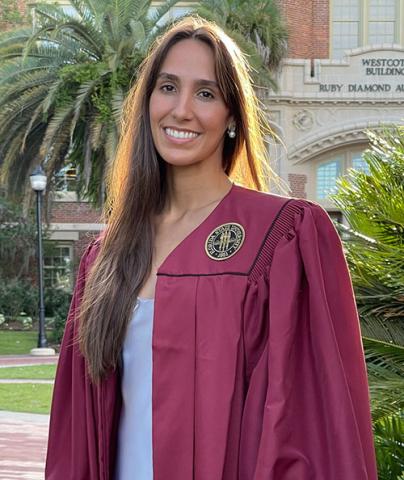Recent Graduate Addresses Human Trafficking in New Role

Born in Buenos Aires, Argentina, Felicitas Brugo Onetti always felt drawn to working with immigrant populations. She volunteered extensively with Guatemalan and Mexican migrant and refugee families while growing up in Miami, Florida and attended several mission trips while earning her social work degree at The Catholic University of America in Washington, DC.
“It is a passion of mine, working with people who are immigrants – like me,” she said. “I always felt called to this population, using my... skills and being a native Spanish speaker to reach more individuals needing help.”
She also felt drawn to Florida State University to round out her social work education. “Florida State had a unique perspective I wanted to explore,” Felicitas explained. “Coming from a high school and attending a major university that was also Catholic, I thought it would be essential for me as a social worker to dive into the sector that was not religiously affiliated to get a better sense of other practices, services and agencies that support individuals.”
Felicitas pursued every realm of experience while in her MSW program with a clinical concentration. She started by working with the Institute for Family Violence Studies housed at the College of Social Work as the lead graphic designer for the latest Student Resilience Toolkit created by the institute. Felicitas also helped to translate the toolkit from English to Spanish.
She was also able to serve as an editor and translator for the institute for their Human Trafficking Prevention and Intervention program, created for the FSU Center for Academic and Professional Development. Her interest in human trafficking also led her to earn the Professional Certification in Human Trafficking Prevention offered through the FSU Center for the Advancement of Human Rights, working directly with its director Terry Coonan.
“I learned a lot working directly with clients in different sectors of the field,” she shared about her field placement and other voluntary opportunities. She completed her field internship with DISC Village Sisters in Sobriety Women’s Residential Program, gaining experience with female clients seeking substance use treatment. “As we all know, substance use disorders frequently have co-occurring issues with mental health disorders, domestic violence, sexual violence, trafficking and more,” Felicitas stressed, noting the importance of gaining an understanding of sexual exploitation and abuse and how to support people with these experiences.
As a Federal Work Study student, she also worked with Dr. Tanya Renn, an assistant professor at the College of Social Work, on a pilot study involving the Gadsden Correctional Facility, working with female inmates focusing on a holistic approach to re-entry.
Through her experiences, she felt more and more drawn to working to address human trafficking, especially since the migrant and refugee populations she has always been so passionate about are particularly vulnerable to it.
These cumulative experiences also prepared her well for her new role as the anti-trafficking education and outreach coordinator for the United States Conference of Catholic Bishops, which brought her back to Washington, DC to work within the Department of Migration and Refugee Services.
“There is a fundamental responsibility, not just for Catholics, but for all people in the U.S. to spread awareness and foster change about human trafficking, both labor and sexual exploitation,” she underscored. “It is a global issue that needs to be addressed and prevented.”
Felicitas noted especially how trafficking has increased since the COVID-19 pandemic, with trafficking and recruitment online skyrocketing. She added that not only have victims of human trafficking become more hidden and isolated from society, but recruitment tactics have changed. She hopes in her new role to improve outreach to other organizations with similar missions to foster change, spread greater awareness and empower victims.
One of the major projects she focuses on is the Amistad Movement, an initiative inspired by the captives aboard the Amistad slave ship who revolted and won their freedom. The initiative works to empower immigrant populations in at-risk communities to prevent them from falling victim to human trafficking. Alongside the Become a Shepherd program, which works to educate priests, nuns, lay religious individuals and other church members on human trafficking education and resources. Felicitas is working to recreate and expand these programs for vulnerable populations such as Hispanic/Latin, Native American, Alaskan Native, Pacific Islander, Black individuals to address the needs of each unique community better.
Felicitas is happy to be a part of the system of change to improve the lives of migrants, refugees and all those impacted by human trafficking, and she credits many of her experiences and mentors at FSU for preparing her for the work ahead.
“My life came full circle when my second week on the job I attended a conference on human trafficking prevention by the U.S. Sisters Against Human Trafficking and Terry Coonan was a speaker,” she said. “I hope to continue engaging individuals and partnering organizations to reach victims, survivors or anyone that can help prevent human trafficking, which is such a crime against the dignity of persons and only damages the welfare of our nation.”
